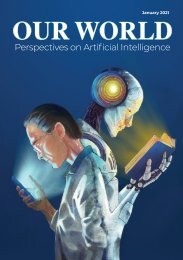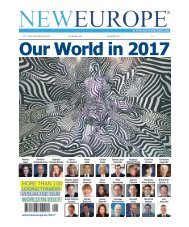Our World in 2018
Leading minds reflect on the state of our societies, and examine the challenges that lie ahead. An edition dedicated to generating ideas that will help form a new vision for our world.
Leading minds reflect on the state of our societies, and examine the challenges that lie ahead. An edition dedicated to generating ideas that will help form a new vision for our world.
Create successful ePaper yourself
Turn your PDF publications into a flip-book with our unique Google optimized e-Paper software.
OUR ECONOMIES
How
Inequality
Works
By Angus Deaton
I
nequality has been named as a culprit in
the populist incursions of 2016 and 2017.
But what is inequality, and what role does it
play in inhibiting or encouraging growth, or in
undermining democracy? Does inequality kill,
say, by driving people to suicide or to “deaths
of despair”? Or is inequality a necessary evil
that we must tolerate at certain levels?
These are questions I am often
asked. But, truth be told, none of them is
particularly helpful, answerable, or even well
posed. Inequality is not so much a cause of
economic, political, and social processes as a
consequence. Some of these processes are
good, some are bad, and some are very bad
indeed. Only by sorting the good from the
bad (and the very bad) can we understand
inequality and what to do about it.
Moreover, inequality is not the same thing
as unfairness; and, to my mind, it is the latter
that has incited so much political turmoil in the
rich world today. Some of the processes that
generate inequality are widely seen as fair. But
others are deeply and obviously unfair, and
have become a legitimate source of anger and
.
In the case of the former, it is hard
to object to innovators getting rich by
all mankind. Some of the greatest inequalities
today are a consequence of industrial and
health revolutions that began around 1750.
countries in northwest Europe. But they have
since improved living conditions and health
outcomes for billions of people around the
Angus
Deaton
Angus Deaton, the
2015 Nobel laureate
in economics,
is Presidential
Professor of
Economics at
the University of
Southern California
and Professor of
Economics and
International
A
University’s
Woodrow Wilson
School of Public and
IA.
world. The inequalities stemming from these
advances – both within and between countries
progress generally.
On the other hand, getting rich by bribing
the state for special favors is clearly unfair, and
rightly resented. Many in the United States
– more so than in Europe – automatically
regard capitalist or market outcomes as
fair, and government action as arbitrary
and unfair. They object to government or
university-sponsored programs that seem to
favor particular groups, such as minorities or
immigrants.
This helps to explain why many white
working-class Americans have turned against
the Democratic Party, which they view as the
party of minorities, immigrants, and educated
elites. But another reason for growing public
discontent is that median real (inflationadjusted)
wages in the US have stagnated over
the past 50 years.
There are two different explanations
for the divergence between median and
top incomes, and it matters a great deal
.T
impersonal and unstoppable processes such
as globalization and technological innovation,
which have devalued low-skill labor and
favored the well educated.
The second explanation is more sinister.
It holds that median-income stagnation is
actually the direct result of rising incomes and
wealth at the top. In this account, the rich are
getting richer at the expense of everyone else.
Recent research suggests that there is
some truth to the second story, at least in the
US. Although globalization and technological
change have disrupted traditional work
arrangements, both processes have the
.
The fact that they have not suggests that
themselves. It will take much more work to
determine which policies and processes are
holding down middle- and working-class
wages, and by how much, but what follows is
a preliminary list.
First, health-care financing is having a
disastrous effect on wages. Because most
Americans’ health insurance is provided by
48 2018 | OUR WORLD










